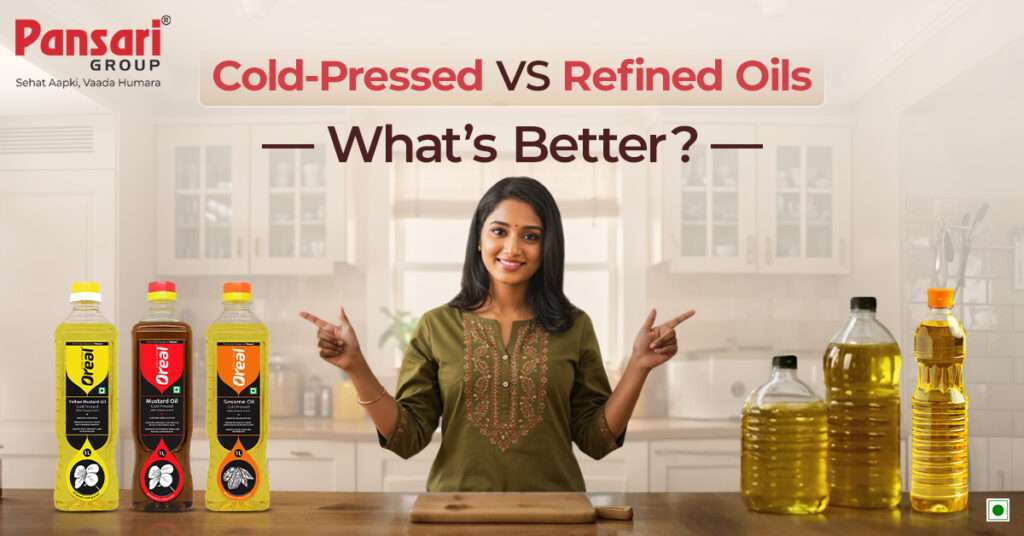It can be overwhelming to choose the ideal cooking oil for the kitchen since there are so many health claims and labels. Most people today debate between using cold pressed oil and refined oil. Both have their pros and cons and supporters and critics. With so much debate it is worth considering the effects on your health, your family’s nutrition, and personal culinary experience.
In this blog, we analyze the benefits of cold pressed oil in detail along with breaking down oil differences that will allow you to conclude which oil is most suitable for your daily cooking.
What is Cold Pressed Oil?
The name itself signifies “without heat”, cold pressed oil is derived from seeds, nuts or fruits using a mechanical press without heat. This process guarantees that the oil keeps its high nutritional value along with its natural taste, fragrance, and essence that can be extracted biologically.
- It involves no heating or chemicals:
- It holds crucial nutrients such as Omega fatty acids and Vitamin E.
- Cold pressed oil is also pure and unrefined in its composition.
Because of its natural extraction method, cold pressed oil maintains the original essence of the seed. Whether you’re using mustard, coconut, groundnut, or sesame, cold pressing retains the flavor and aroma that defines these oils.
What is Refined Oil?
Refined oil undergoes several industrial processes involving heat, chemicals, and bleaching agents to make it appear clear and extend its shelf life.
- Subjected to high-temperature processing
- Uses chemical solvents like hexane
- Often deodorized to mask smell
While refined oils may seem convenient, the process strips away many natural nutrients. The final product may be stable for frying but loses much of its nutritional value.
Cold Pressed vs Refined Oil: Key Differences
Let’s explore the debate of cold pressed vs refined oil from a practical lens. Understanding how each impacts cooking and health can offer clarity:
| ASPECT | COLD PRESSED OIL | REFINED OIL |
| Process | Mechanical, no heat | High heat & chemicals |
| Nutrients | Retained | Mostly removed |
| Shelf life | Shorter | Longer |
| Flavour | Rich and Natural | Neutral |
| Usage | Low medium heat cooking | High-heat frying |
When comparing which oil is better for cooking, it depends on what you’re preparing. For sautéing and salad dressings, cold pressed oil offers better taste and nutrition. For deep frying, refined oil may be more stable but compromises health.
The Benefits of Cold Pressed Oil
Choosing cold pressed oil isn’t just about health trends. It offers real, measurable benefits that impact your wellness over time.
- Nutritional Value: Retains essential fatty acids, antioxidants, and vitamins.
- Heart Health: Rich in monounsaturated and polyunsaturated fats that promote heart health.
- Better Digestion: Due to its natural composition, it’s easier to digest than chemically altered oils.
- Boosts Immunity: Loaded with antioxidants that help in fighting inflammation.
These cold pressed oil advantages make it a go-to choice for those seeking a healthier lifestyle. The oil’s purity ensures it nourishes the body without the side effects linked with refined oils.
Is Cold Pressed Oil Healthy?
This is a question asked often, is cold pressed oil healthy compared to other oils? In short, yes. Its unrefined nature makes it far less likely to contain trans fats or harmful by-products from high-heat processing.
- Supports cholesterol management
- Preserves natural phytonutrients
- Ideal for kids and elderly due to its gentle impact on the digestive system
Moreover, using cold pressed oil in moderation can help maintain overall health, particularly when combined with a balanced diet.
When Should You Choose Refined Oil?
Refined oil isn’t inherently evil. It does serve a purpose in high-temperature cooking where cold pressed oils might break down.
- Suitable for deep frying and prolonged cooking
- More economical for bulk cooking
- Longer shelf life ideal for commercial use
However, frequent use of refined oil can lead to long-term health concerns. If used, it should be balanced with healthier options like cold pressed oil for daily meals.
Which Oil is Better for Cooking Daily?
So, which oil is better for cooking on a daily basis? The answer lies in your cooking style. For daily Indian cooking that includes light sautéing, tadkas, and dressings, cold pressed oil is a superior choice.
- Enhances taste naturally
- Offers higher nutritional value
- Less processed and thus easier on the body
For occasional frying, a combination approach works well, use refined oil sparingly and rely more on cold pressed oils for everything else.
Cold Pressed Oil in the Indian Kitchen
In traditional Indian kitchens, oils like mustard, coconut, and sesame have been used for centuries. The resurgence of cold pressed oil taps into this wisdom, offering a healthier path forward.
- Use mustard oil for pickles and stir-fries
- Use sesame oil for South Indian delicacies
- Use groundnut oil for daily cooking
This not only honors traditional methods but also brings back the nutritional richness of our heritage foods.
Final Verdict: Cold Pressed Wins for Health
In the debate of cold pressed vs refined oil, the cold pressed variety stands out for its health benefits, flavor, and minimal processing. It respects the integrity of the seed and transfers that purity to your plate.
While refined oil has its place in high-heat or commercial kitchens, for a conscious and health-forward lifestyle, cold pressed oil is undoubtedly the best cooking oil for daily use.
In summary:
- Choose cold pressed oil for regular cooking
- Understand the cold pressed oil advantages before switching
- Ask yourself daily, is cold pressed oil healthy for my family? The answer will guide your grocery choices
Bring home the authenticity of unprocessed oils. Choose wellness with every drop. Choose PANSARI‘s range of cold pressed oil, where tradition meets trust.

